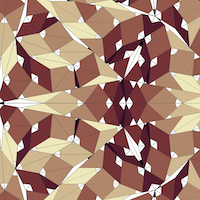Generalized Robinson Triangles
It is possible to generalize the Robinson Triangle which is mld to the Penrose Rhomb tiling for odd $n \geq 3$.
The inflation factor is equal to the longest diagonal of a regular n-gon, in detail $\frac {\cos(\frac{(n-1)\pi}{2n})} {\cos(\frac{\pi}{n})}$.
All tilings have $m=\frac{n-1}{2}$ prototiles in the shape of isosceles triangles with all interior angles are multiples of $\frac{\pi}{n}$.
The substitution matrix was derived by D. H. Warrington in [War1988]
:
$ m m-1 ... 3 2 1$
$m-1 m-1 ... 3 2 1$
$...$
$ 3 3 ... 3 2 1$
$ 2 2 ... 2 2 1$
$ 1 1 ... 1 1 1$
The case $n=3$ is a periodic tiling of equilateral triangles.
The case $n=5$ is the Robinson Triangle tiling.
The case $n=7$ is Danzer’s 7-fold variant.
The cases $n\in\left\{ 9,11,13,15\right\}$ were derived by T. Hibma, see [Hib2015a]
for details.
The cases $n\in\left\{ 17,21\right\}$ are Say-awen 17-fold and Say-awen 21-fold.
References
[Hib2015a]
T. Hibma
Half Rhombs
2015?,
https://www.aperiodictiling.org/wpaperiodictiling/index.php/fractional-rhomb-tilings/half-rhombs/
[War1988]
Warrington, D. H.
Two Dimensional Inflation Patterns and Corresponding Diffraction Patterns
Quasicrystalline materials: proceedings of the I.L.L./CODEST workshop, World Scientific: Singapore
1998,
243-254,



